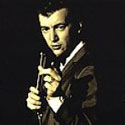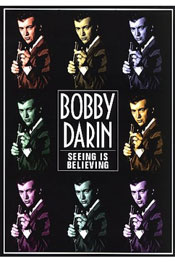
Bobby Darin: Seeing Is Believing
directed by Victor Sheldrake
starring Bobby Darin, Bobbie Gentry, Connie Francis
Hyena

In a handful of the material recorded and filmed for Bobby Darin’s TV variety show in 1972, there appears to me to be an autopilot behind his eyes. If memory serves from the few Darin biographies that I have read, it was a time when he’d turned away from the rock/folk aspirations he’d been exploring and returned to being the old showman that he was. He was near the end of his life and looks like he knew it even if few others did.
But the thing is, close your eyes and listen, and you’d never know it. His skill as a performer was that great.
The worst thing I can say about this material is it might better be heard than seen. Which for a musical performance DVD isn’t too bad… except that it runs counter to the stated intention of co-producer Joel Dorn.
Dorn writes on the inside cover that he wants this to be an argument for Darin as a great entertainer. One who must be seen as well as heard to be fully appreciated; hence the title. And I’m sorry, but I just don’t see it. In David Evanier’s book Roman Candle he quotes Darin’s longtime manager Steve Blauner saying that at the time, due to sickness, Darin’s capacity was only: “70 percent, but only I knew it was 70, that’s how good he was.”
It shows a little bit more than that, at least on tape. The same book quotes another Steve, singer Lawrence, arguing: “Seeing Bobby on tape is not the same as when you’re in the room and feel the heat of the performer.” He may well be right. But you know what? I especially like it when Darin mostly just stands and sings, as on “Cry Me A River” here.
A couple of years ago I reviewed Hyena Records’ Bobby Darin CD/DVD set, Aces Back To Back, Dorn’s first ambitious attempt to put together a case for Darin as both underrated and influential.
This follow-up solidifies Dorn’s case, featuring performances that seem mainly taken from that variety show near the end of his career; plus a couple from the Ed Sullivan show nearer to the beginning.
The material contains all the hits you’ll know if you know any, but the invaluable tracks are those that show Darin doing something a little more unconventional. Or even something conventional in an unconventional way.
For instance, it wouldn’t really surprise anybody to see Darin performing a Cole Porter-written tune like “I’ve Got You Under My Skin.” That kind of swinging material is what he did better than anyone arguably after Sinatra. It’s what he does with it here that’s the real surprise, in a great arrangement reminiscent of rock and roll.
Unfortunately, 1972 was not a good period for more “modern” pop music. Darin couldn’t do much with the likes of Neil Diamond songs, but then I’m not convinced anyone could apart from UB40 or the Monkees. And “Happy” just shows that given the wrong collaborator (Michael Legrand), even a quintessentially great songwriter like Smokey Robinson can write dreck.
On the other hand, give Darin a song like “Higher & Higher,” Duke Ellington’s “Caravan,” or Harold Arlen and Johnny Mercer’s “Come Rain Or Come Shine”…
And you’re not going to go too far wrong.
And it’s not to say that there is nothing for the eyes on this disc, either. Look at “Got My Mojo Working” in which Darin plays blues harmonica, sings, and plays vibes. And a couple of duet performances, with Bobbie Gentry and Connie Francis, seem to bring out the best in him. He looks at them with intimacy that may be feigned, but you’d swear they were just waiting for the director to call “cut” so they could kiss. The Francis performance is one of those from the Ed Sullivan show featuring a younger Darin, who is definitely in the driver’s seat.
Aces came as we were seeing a brief resurgence of Darin material both on record and in books all swirling around Beyond The Sea, the biopic directed, starring and written by Kevin Spacey.
In some ways it’s hard to imagine any biopic telling the story of Darin’s life better than a well-sequenced anthology like Aces or, at greater length, the much-coveted As Long As I’m Singing collection. He really did pack a lot of story into a short life.
He died while still in his 30s but by that time he’d been a recording artist for around 20 years. And he’d gone from the ’50s novelty record “Splish Splash” to songs of concern for what was going around him, like the anti-war “Simple Song Of Freedom.”
Full disclosure- I’ve yet to see Beyond The Sea, but it’s fair to say it didn’t find a place in the hearts of most critics or audiences. It seems to be regarded now as having been less about Darin’s life than Spacey’s vanity.
However, even if that’s true, we might thank Spacey for focusing attention on Darin’s artistry even unsuccessfully. Certainly I can if it led even indirectly to the release of an album that topped my list of Albums That Got Me Through 2004, and left me knowing I wanted to investigate this Darin fellow further.
Further investigation has yielded this perhaps not-terribly-profound but sincere thought: “Aces” is right.
Bobby Darin: http://www.bobbydarin.net/main.html












